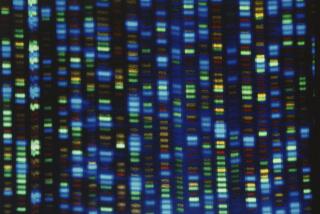BOOK REVIEW : What Hath Genetic Revolution Wrought? : THE CODE OF CODES <i> edited by Daniel J. Kevles and Leroy Hood</i> ; Harvard University Press $29.95; 384 pages
- Share via
Imagine yourself facing a one-in-two chance that sometime in the middle of your life you would be stricken by a disease that caused your intellect to wither, your body to jerk and writhe uncontrollably, and your emotions to careen from manic hallucinations to suicidal depression. You would helplessly endure this torture for as long as 25 years before the affliction, called Huntington’s disease, finally killed you.
Now, if you could find out, by means of a simple test, whether this incurable disease would someday strike you, would you want to know? Would you want your intended to know? Your employer? Your insurance company? Your mortgage lender?
Until recently, these questions would have been meaningless, for inherited diseases could be diagnosed only after their symptoms appeared--sometimes in middle age. But now, owing to a revolution in the science of human genetics, doctors can diagnose inherited diseases prenatally.
Today, about 30 hereditary diseases fall into this category, including cystic fibrosis, sickle cell anemia, Tay-Sachs and Down’s syndrome, to name some of the better-known ones. Evidence is building that heart disease, cancer, schizophrenia, manic-depressive illness and even alcoholism have a genetic basis. As knowledge of human genetics grows, scientists say, the number of diseases that prove to be at least partially inherited will increase dramatically.
The consequences of this new knowledge will be enormous, not only for the afflicted individuals, but for all of society. Some social scientists fear the creation of a “genetic underclass” of people who will be all but uninsurable and, thus, unemployable.
An enormous boost was given to research in human genetics in 1990, when the federal Human Genome Project was launched. The project’s goal is to discover where every human gene is located. The $100 million-a-year project--the most expensive piece of biological research in human history--is scheduled to be completed by 2005.
So far, the research is on track, according to Caltech professors Daniel J. Kevles and Leroy Hood, who edited the impressive “Code of Codes,” a collection of 13 critical essays by leading biologists, computer scientists and social scientists commenting on both the Genome Project itself and the important ethical implications of the new discoveries in human genetics. The book grew out of a Caltech lecture series funded by the Genome Project’s Ethical, Legal and Social Implications Program.
Perhaps the most troubling ethical question raised by the Genome Project is just what should be done with newly discovered knowledge about inherited diseases. The contributors to “The Code of Codes” emphasize that finding the genes that cause genetic diseases won’t necessarily lead to cures for such diseases. As difficult as discovering the complete set of human genes will be, the scientists caution, developing cures for genetically-based disorders will be infinitely harder: more time-consuming, more expensive, and maybe impossible.
Meanwhile, the contributors ask, how should the new genetic knowledge be applied? Abortion, they say, will become a more heated issue than ever. Some parents-to-be may consider ending pregnancies when, as in the case of Huntington’s disease, the unborn has a 50-50 chance to live a normal life. One contributor even warns of a new genetically engineered form of eugenics, or genetic purification.
Eugenics was once widely accepted, at least in theory, as a way to improve the human stock. Until the 1930s, for example, a California law permitted sterilization of mental incompetents. Applied eugenics reached a hideous logical extension in Hitler’s death camps and Aryan human-breeding farms before scientists rejected, for ethical reasons, the idea of improving the human race through genetic manipulation.
But the new discoveries in molecular genetics have brought eugenics back, and the specter of Hitler’s excesses raises the question of who should have access to the new genetic information. Big Brothers abound. Insurers, for example, have a financial interest in knowing as much about applicants for health policies as the applicants know about themselves.
On the other hand, many people who fear they carry genes for inherited diseases may not want to know the truth about their own condition. Indeed, one of the contributors to “The Code of Codes,” Nancy Wexler, a world authority on Huntington’s, herself has a 50% chance of contracting that horrible disease--and she has reportedly elected not to be tested for it.
Wexler and others who have family histories of genetic diseases are only human, after all. And humans can take only so much reality. Laudable though the Human Genome Project may be scientifically, this reviewer can’t help but wonder whether we’d be better off if some knowledge remained undiscovered.






